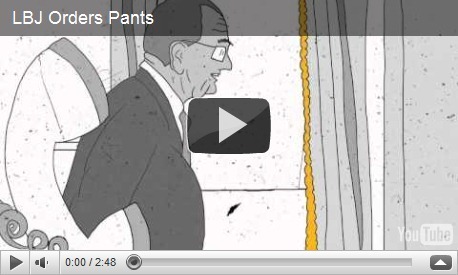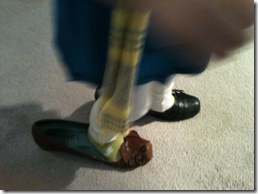Matthew Dicks's Blog, page 641
January 20, 2011
The mindless hum of mindless agreement
On a recent episode of Oprah (forcefully viewed from a waiting room), I heard Gavin de Becker, author of THE GIFT OF FEAR, say:
"Men fear that women will laugh at them. Women fear that men will kill them."
The predominantly female audience nodded in approval, humming their lilting agreement, suddenly beset by this brilliant bit of insight and profundity.
Had I been in the audience, I would have risen from my seat and shouted, "Really? Are you kidding me? Are we going to allow such enormous and ridiculous generalizations to go uncontested?"
Even in the waiting room, I nearly did.
How about this:
More than 80% of all murder victims in the United States are men.
Am I really expected to believe, based upon these statistics, that women universally fear that men will kill them even though they make up less than 20% of all murder victims?
And that men, even though they make up more than 80% of victims, are more concerned with laughter than death?
How about this:
The audience was almost entirely made up of women. How the hell do they purport know what men fear? Having been a man for my entire life, I can assure you that we have much greater fears than girls laughing at us.
More importantly, as one-dimensional as we may sometimes seem, I can assure you that we don't all share the same fears. To assert so is blind stupidity.
How about this:
As far as I can tell, every man I know, myself included, goes through life being laughed at constantly, by both women and men. And most of us have learned to deal with it.
In the practical joke world, men are the primary targets. In fact, I cannot remember a time in my life when a woman was the butt of a serious practical joke. But I watch men actively seek out ways to embarrass and ridicule their friends on a daily basis, myself included.
Imagine a dance floor at a wedding:
Who is more likely to be dancing like a fool, unconcerned about the ridiculousness of his or her appearance?
With more than 300 weddings under my belt, I can tell you that I have never seen a woman act like an idiot on the dance floor, attempting some bizarre and unorthodox dance move, but I have seen hundreds of men, both drunk and sober, do the most ridiculous things with their bodies while everyone else is laughing at them.
There are three examples of this male-centered behavior in my wedding video alone.
Am I really expected to assume that men fear the laughter of women?
How about this:
Can we all agree to keep our generalization radars turned on?
Can we all agree to refute ridiculous attempts to generalize whenever they arise?
There's nothing worse than that audible hum of agreement from an audience of head bobbing morons who would rather be herded like sheep to some ridiculous conclusion rather than stopping and thinking for themselves.
Do she not speak good on purpose?
I liked this paragraph from in The Economist a lot:
"It's not exactly a surprise that Mrs Palin uses the English language the way most people do: confusingly. This is part of her demotic charm. At critical moments, she has an uncanny, or perhaps very canny, ability to say precisely the wrong thing, or a strangely garbled version of the commonplace thing, in a way that makes a significant segment of the population sympathise with her because they might have done the same. And after all, linguistic mistakes are a relative concept; the people who made the Great Vowel Shift happen did so by speaking "incorrectly", and in a hundred years our progeny may all be speaking more like Mrs Palin, as disturbing as some of us may find that prospect."
Canny or uncanny?
Based upon everything we've seen so far, probably uncanny.
She's either a Machiavellian linguistic mastermind who bounced around six colleges over a period of five years before receiving a Bachelor's in Communications or she is exactly what she appears to be.
Either way, if any of my progeny end up speaking like her, this progenitor is going to kick their ass.
Not booing. Just cheering.
Why do sports fans almost exclusively call out players names in unison when the name can be made to sound more like a boo then a cheer?
I can't tell you how many times I have had to explain to an inexperienced sports fan that the crowd is not booing but simply calling the name of a player that sounds like a boo.
For the Green Bay Packers, it's running back John Kuhn.
"Kuhn!" Packers fans shout whenever he touches the the ball.
Aaron Rodgers is their superstar quarterback and Clay Matthews is their defensive juggernaut, but the fans never call out "Rogers!" or "Clay!" in unison during a game.
Just "Kuhn!" Their effective-but-nothing-special tail back.
For the Celtics of the 1980's it was Robert Parish, whose nickname was Chief. Somehow, Celtics fans managed to transform the vowels in the the word Chief into a low, resonate O sound.
"Chief!" they would call out every time he scored.
Never a unified cheer for fellow Hall of Famers Larry Bird or Kevin McHale.
Just "Chief!"
For the current iteration of the Boston Red Sox, it's "Yoook!", the cheer for their first baseman, Kevin Youkilis.
For the New York Yankees and Dallas Cowboys of ten years ago, it was "Moose!", called out for now retired starting pitcher Kevin Mussina and current NFL analyst and retired fullback Daryl "Moose" Johnson.
What gives?
January 19, 2011
He needs more room in the crotch
Lyndon Johnson orders pants.
If only we had more recordings like this. You must listen.

You know… I just had a thought.
Slate recently posted a piece about how many assassins have three names.
I actually sent the piece to a buddy who has a hyphenated last name, just to let him know that I am keeping an eye on him.
It just occurred to me that Lyndon Johnson, successor to John Kennedy, is more commonly referred to as Lyndon Baines Johnson.
Three names.
Successor to Kennedy.
Possibly linked to the assassination in the extremely factual movie by Oliver Stone.
I may be on to something.
Social stupidity cannot be covered up by the violin
Amy Chua's new book describes what she calls "Chinese parenting." Her methods include:
No sleepovers No play dates No television, video games or arts and crafts Hours of closely monitored instrumental music practice Threats to burn stuffed animals if a piece of music isn't played perfectly Required revisions of homemade birthday cards Hours of academic study every day without exceptionAs you might imagine, the book (and her methods) have been criticized by many, and while my gut told me that her parenting style couldn't be good, I wasn't able to put my finger on why I felt this way.
Then I read David Brooks' piece in the Times.
In critiquing the parenting described in Chua's book, Brooks writes:
"Practicing a piece of music for four hours requires focused attention, but it is nowhere near as cognitively demanding as a sleepover with 14-year-old girls. Managing status rivalries, negotiating group dynamics, understanding social norms, navigating the distinction between self and group — these and other social tests impose cognitive demands that blow away any intense tutoring session or a class at Yale."
Brilliant. And so true.
What would you prefer for your child?
Average academic performance and mediocre musical ability along with strong social skills, a core group of friends, and the ability to function effectively in a group?
Or…
Exceptionally high academic performance and instrumental musical mastery accompanied by little or no experience with interacting with others outside the family?
I'm not saying Chua's children will turn out to be social misfits, but it is reasonable to assume that their chances of becoming misfits is greater than those who interact with other children on a regular basis.
In my life, academics has always been easy. I graduated from high school and four different colleges in the top 10% of my class or better each time, and I did so in each case while working at least one full-time job (high school included).
Wow. That fact never occurred to me before.
But it has always been the social realm that I have found the most difficult to decipher.
I am rarely the most effective member in a group and usually prefer working alone or with one other person.
I have difficulty with small talk.
Unlike my wife, it is a challenge for me to walk into a room of strangers and emerge with three new friends.
I do not remember names well.
I often lack a filter in terms of the things I say.
Earlier this year, colleagues who were leading a new initiative for our school were worried the most about me and my potential resistance to their new system, because in opposition, I can be quite difficult.
I tend to generate a love or hate reaction from many people, and when you hate me, you really hate me.
I am overly direct and unnecessarily honest.
I flaunt social mores.
My wife receives phone calls from angry family members who I have offended but who would prefer to avoid my wrath.
I was told that I was "physically intimidating" this year while debating the merits of a decision with someone.
I am rarely dressed for the occasion.
I judge intelligence unfairly and by using rather arbitrary means.
I created a Friendship Application.
The eye roll-to-eye blink ratio that I engender in others is not good.
I could go on.
I think David Brooks is right. The social realm, with its limitless variables and unending string of unexpected personal interactions, is infinitely more difficult to negotiate than a piece of music or a chemistry textbook.
And to deny children experience in this realm strikes me as short sighted and foolish.
I also find it interesting that Chua is a professor and an author, professions to which I was drawn as well.
While there are many reasons why I (and presumably Chua) decided to become a teacher and writer, perhaps part of the reason is that both careers provide us with a great deal of autonomy and do not require us to work in groups.
Writing is a solitary business, and while teaching provides me with an endless string of student-teacher interactions, these are structured interactions that take place in a clearly defined teacher-student relationship. I have the power, and there are fewer unknowns than the interactions at a dinner party or similar social gathering.
Perhaps it's not surprising that Chua underscores the importance of social interactions since her choice of professions seems to underscore it as well.
I just wonder if people roll their eyes at her as often as they do at me.
January 18, 2011
Worst day
As I exited my bedroom on Sunday morning, carrying my dog in my arms, my foot hit an enormous pile of cat puke in the middle of the hallway. I slipped, fell backwards, and landed hard in the puke while trying not to drop my dog.
I ended up with cat puke on my feet. pants and shirt.
This was not the worst part of my day.
Six hours later I was parked in a handicapped spot adjacent to Gillette Stadium, waiting for the Patriots-Jets showdown. We were eating ribs and filet mignon off the grill and watching the early game on our tailgate television.
This is was the best part of my day.
An hour before game time, my phone rang.
Elysha was spending the weekend at with her parents in the Berkshires, and since I had not spoken to her all day, I assumed that she was calling when I saw her parent's house number listed on my phone.
"Hi honey!" I said.
"This is not your honey. This is your father-in-law."
After exchanging pleasantries, my father-in-law good naturedly attempted to put the upcoming football game in context for me, reminding me that if the Patriots somehow lost, it would not be the end of the world. He told me that he was concerned for his daughter and granddaughter in the event that I came home from Foxboro after a loss. "I want the Patriots to win," he said with much gravitas. "Because I like the Patriots. But I want them to win even more because of what I know a loss would do to you. And what it would in turn do to Elysha and Clara."
Essentially, he was asking me to be nice to Elysha and Clara if the Jets won.
While his advice wasn't necessary, it wasn't far off, either.
He ended the call by advising me to stay warm and saying goodbye, and I waited for him to put Elysha on the phone.
She never came on. She wasn't even in the house when he called.
he must have taken the call very seriously.
During the beginning of the third quarter of the game, with my team trailing 21-11, I was standing in line at the men's room when a large man cut the line just behind me, using a girder to conceal his crime. The guy in front of me, whom I had been speaking to while waiting, saw the large man cut the line and called him out for his infraction.
A series of profanity-laden threats ensured, ending with my newfound friend saying, "If you tell me to shut up one more time, I'm going to kick your ass!"
"Shut up," the cutter said, sticking his chin out, just daring the guy to hit him.
POW! A fist connected with his the cutter's head, followed by a flurry of fists from both sides. Seconds later security had separated the two and asked who had witnessed the fight.
"He did!" my newfound friend said, pointing at me. He was hoping that I would help him out based upon our two minutes of bonding in the restroom line.
I did. I exaggerated the story to make it sound like the guy who did the cutting had shoved his way in line, possibly throwing an elbow in the process. I made the cutter out to be an angry, belligerent, possible drunk jerk, which was not far from the truth.
My wife has taught be to despise a cutter.
Either way, both guys had thrown punches and were probably being arraigned in the Gillette Stadium jail underneath the stadium by the time the fourth quarter rolled around.
They arrest about forty people per game.
As a result, I missed about eight minutes of the third quarter.
It turns out that I didn't miss much. The Patriots lost to the despicable, loud mouthed, no good, genuinely rotten Jets in a loss that may have hurt more than any of the three Patriots Super Bowl losses.
I hate the Jets that much.
As my friend and I were leaving the stadium, I saw a small boy, probably seven or eight years old, crying as his father led him by the hand down the ramps toward the parking lot.
I understood the tears. I wanted to shed some of mine as well.
To make the day complete, my friend ignored my pleas to turn left as we approached the onramps to the highway and instead obeyed his GPS system, which put us on I-495 heading in the wrong direction. We traveled fifteen minutes south before being able to turn around and drive past the stadium all over again.
Just what I needed.
The GPS had been inexplicably set to avoid toll roads, and my buddy chose to ignore the guy who had once lived along this stretch of I-495 in favor of his damn machine.
A perfect ending to one of the worst days of my life.
My three teeny, tiny bright spots from the day included:
The Patriots started five rookies on defense and one on offense, and the team has more draft picks than any other team in the upcoming draft. They are built to be very good for years to come. I do not need to worry about finding tickets to the Super Bowl, which had been a plan in the works before Sunday. I completed MEMOIRS OF AN IMAGINARY FRIEND the next morning and sent it off to my agent for what I hope will be a light series of revisions and a quick sale.It's not much, but it's something.
Actually, it's not. Nothing can make up for the loss. It was that bad.
It's remarkable how emotionally invested a person can become in a football team.
Turns out my father-in-law was right to call after all.
Podcasting advice from a professional listener
I know this won't pertain to many of my readers, but perhaps it will be forwarded to those who need to hear it.
I listen to a lot of podcasts on a daily basis, and I couldn't be more happy with the free information and entertainment that they provide.
I start my morning with the New York Times Front Page podcast, which summarizes the front and inside sections of the newspaper for me.
I listen to a handful of NPR and ESPN podcasts for news and sports, a couple of CNET podcasts for technology news, and a bunch of New Yorker and Slate podcasts for political and cultural analysis.
I listen to book related podcasts from sources like Barnes & Noble, the Times, and Books on the Nightstand.
I get my science news from a handful of Scientific American podcasts,the Times weekly science podcast, TED Talks, and RadioLab, a WNYC podcast that I could not recommend more highly.
And then there are podcasts like This American Life, Diggnation and The Moth, which serve primarily to entertain.
In all, there are 38 different podcasts that I listen to on a daily, weekly or monthly basis depending on how often they are released.
And after hundreds, if not thousands of hours of listening, I have come up with a short list of advice for podcasters everywhere.
Here goes:
What All Podcasters Should Keep in Mind Prior to Recording
1. We don't care where you record your podcast or the current weather in that locale.
2. We don't care about any glitches or technical snafus that took place prior to recording.
3. We don't care about the temperature or any other conditions in the room in which you are recording.
4. We don't care about how tired, sick or jetlagged your are, especially if you have just finished vacationing somewhere or attending a conference that your listeners would have enjoyed attending as well.
5. We don't care if you have an advertisement somewhere in your podcast as long as you don't continue to talk about the advertisement after is has run.
Mismatched but perfect
January 17, 2011
Mammoths, octopi and a whole bunch of spoons
Three random observations:
1. Anyone who criticizes Alanis Morissette's song Ironic for its lack of irony is an intellectual douche bag. It's a four minute pop song. It need not be held up to a literary standard.
And sure, "ten thousand spoons when all you need is a knife" is not ironic by the truest definition of the word, but it seems pretty damn ironic to me.

2. I know it was based upon the Ian Fleming novel, but how does the movie Octopussy get made with its original title?

3. Woolly mammoths returning to the world? It's about time.
Unmotivated for a reason
I have a brilliant friend who is unmotivated.
'Check that. The guy has a good job that he does well. He owns his own home and has a retirement plan in place.
He has his life together.
But coming from the perspective of a guy with a teaching career, a writing career, a small ministerial career, as well as the owner of a small business(and the desire to become a life coach and a jumper-talker-downer as well), I feel like he is wasting his talents.
Unsurprisingly, he disagrees.
One of our mutual friends find his lack of motivation baffling, so I put a list of reasons why he is unmotivated.
I have since reviewed the life with my friend and he concedes all points. And it occurs to me that it is a fairly comprehensive list of reasons why someone might not be motivated.
Here is the list:
He was adored by his parents and raised in a loving and supportive household, therefore he does not feel the need to prove his worth to the world. He was an only child. Therefore he did not need to compete for attention at a young age. He does not place a high value on material possessions. He is content with simple pleasures. While not financially well off, he is financially secure. He possesses a strong sense of self and cares little for what others may think of him. He is divorced with no intention of remarrying, so he has no need to impress a woman.It really is the perfect storm for contentment, or from my perspective, a lack of motivation.
Anything from the list that I might be missing?








